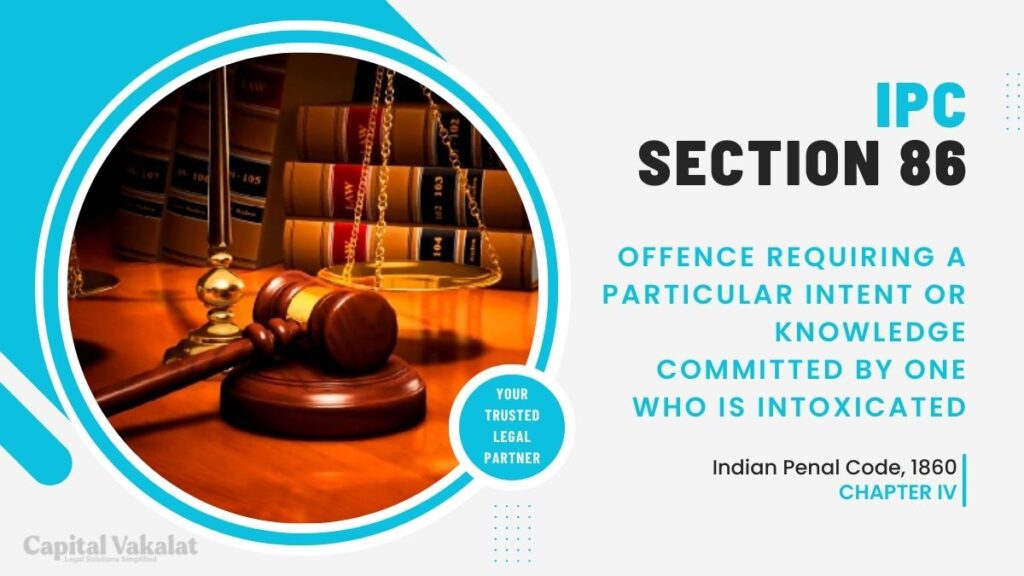In the realm of criminal law, Section 86 of the Indian Penal Code (IPC) is a provision that delves into the intricate nuances of criminal liability concerning individuals who commit offenses while intoxicated. This legal provision is a reflection of the law’s commitment to ensuring that justice is served while taking into account the complex interplay of intent, knowledge, and intoxication.

In this article, we will delve into the depths of Section 86 IPC, exploring its intricacies, implications, and the legal principles that underpin it.
Understanding the Basics
What is Section 86 of the IPC?
Section 86 of the IPC, which falls under Chapter IV (“General Exceptions”), is a critical legal provision that deals with situations where an individual commits an offense, but their intoxication at the time of committing the act raises questions about their criminal liability.
Elements of Section 86 IPC
To better comprehend the implications of this provision, it is crucial to break down its core elements:
- Voluntary Intoxication: The accused must have voluntarily consumed alcohol or drugs.
- Lack of Intent or Knowledge: The individual must have been in such a state of intoxication that they were incapable of forming the required intent or knowledge necessary to commit the offense.
The Concept of Mens Rea
The Importance of Mens Rea
Mens rea, or the guilty mind, is a fundamental concept in criminal law. Section 86 IPC is rooted in the idea that for an individual to be held criminally liable, they must possess the necessary intent or knowledge required for the offense.
How Intoxication Affects Mens Rea
One of the key aspects of Section 86 is the effect of intoxication on an individual’s mens rea. When intoxicated to the extent that they cannot understand the consequences of their actions, it becomes challenging to establish criminal intent.
Degrees of Intoxication
Degrees of Intoxication Matter
Not all forms of intoxication are created equal. The law recognizes that there are varying degrees of intoxication, and Section 86 considers this when assessing criminal liability.
Legal Thresholds
Courts often evaluate the level of intoxication to determine whether it is sufficient to negate criminal intent. This assessment varies from case to case, making it a complex legal issue.
Court Decisions and Precedents
Landmark Cases
Over the years, Indian courts have encountered numerous cases where Section 86 IPC played a pivotal role in determining the accused’s guilt or innocence. Examining these cases sheds light on the application of this provision.
Legal Interpretations
The interpretations of Section 86 by different courts highlight the challenges and debates surrounding this provision. Understanding these interpretations is essential to grasp its practical implications.
Balancing Justice and Accountability
Striking a Balance
Section 86 IPC exemplifies the legal system’s delicate task of balancing the need for accountability with an understanding of human frailty, especially when influenced by intoxicants.
The Role of Rehabilitation
In some cases, the law may prioritize rehabilitation over punishment when dealing with offenders who committed crimes while intoxicated. This is in line with the broader goals of the criminal justice system.
Conclusion
In conclusion, Section 86 of the Indian Penal Code serves as a significant legal provision that addresses the complexities of criminal liability in cases of intoxication. It requires a meticulous examination of intent, knowledge, and the degree of intoxication to establish whether an accused individual should be held criminally responsible for their actions. This provision, while essential for justice, also highlights the legal system’s responsibility to consider the nuances of human behavior and vulnerability when dispensing justice.
FAQs
Can someone escape criminal liability if they were intoxicated at the time of the offense?
Intoxication may negate criminal liability if the accused was unable to form the required intent or knowledge due to their level of intoxication.
Are there different degrees of intoxication recognized by the law?
Yes, the law recognizes varying degrees of intoxication, which can impact an individual’s criminal liability.
How do courts assess the level of intoxication in Section 86 cases?
Courts evaluate the level of intoxication on a case-by-case basis, considering the specific facts and circumstances.
Does Section 86 IPC prioritize rehabilitation over punishment?
In some cases, the law may prioritize rehabilitation, aligning with the broader goals of the criminal justice system.